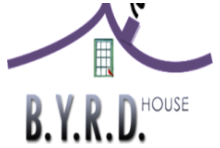B.Y.R.D. House – Behavioral Youth Resource Development Inc. – was founded in December 2009. It was birthed out of a desire to provide community based alternatives for youth and families where our non profit could provide appropriate strategies to connect youth and families with professionals who can provide the support and guidance necessary for positive socialization.
B.Y.R.D. House is currently offering Mental Health Services, Case Management Services and Afterschool Youth ... Meer lezen
B.Y.R.D. House – Behavioral Youth Resource Development Inc. – was founded in December 2009. It was birthed out of a desire to provide community based alternatives for youth and families where our non profit could provide appropriate strategies to connect youth and families with professionals who can provide the support and guidance necessary for positive socialization.
B.Y.R.D. House is currently offering Mental Health Services, Case Management Services and Afterschool Youth Development Services.
OUR MOTTO
More, Better & Before
We strive to do more than is expected of us, better than expected of us, and before it is expected.
B.Y.R.D. House is a non profit organization that has been serving youth and families since September 1997 under the African American Task Force For Substance Abuse Prevention, Incorporated. We began developing prevention models to help reduce risk factors associated with poverty, family dynamics, school stresses, individual and peer structure and substance abuse. In December of 2009 B.Y.R.D. House applied for its own non profit status and incorporation of B.Y.R.D. House, Behavioral Youth Resource Development, Incorporated.
PHILOSOPHY
B.Y.R.D. House believes that when we provide a safe nurturing environment for our participants where they learn how to respect themselves and others this will reduce the likelihood of juvenile delinquency, drug abuse, truancy, and other problems and high risk behaviors among participating youth and increase the likelihood of positive outcomes.
VISION
B.Y.R.D. House is an organization that was created to help reduce risk factors associated with poverty, family dynamics, school stresses, individual and peer structure and substance abuse. We have appropriate strategies in place to connect these youth and their families with professionals who can provide the support and guidance necessary for positive socialization.
SERVICES
Case Management
B.Y.R.D. House Case Management Services plan, secure, coordinate, monitor, and advocate for unified goals and services with organizations and personnel on behalf of individuals and families. Intensive Case Management services provide a coordinated, comprehensive array of services through the ongoing support of and frequent contact with a trusting, caring case manager.
Purpose: Individuals and families who receive Case Management Services access and use resources and supports that build on their strengths and meet their service needs.
Mental Health Services
B.Y.R.D. House Outpatient Mental Health Services address mental health symptoms, diagnoses, and associated functional impairments; help manage co-occurring health and substance use conditions that interact with and affect the mental health presentation; and provide support for psychosocial adjustments related to life cycle issues, including: birth and death; trauma; aging; marriage; divorce; parenting; intergenerational conflicts; reintegration challenges for service members and veterans; and adult, child, and family relations.
Purpose: Individuals who receive Outpatient Mental Health Services that target goal-directed interventions for diagnosable conditions make gains in symptom reduction, improved self-management, and restored or enhanced daily functioning.
Beat The Street - Youth Development Services
B.Y.R.D. House Youth Development Services engage school-age youth in a variety of social, educational, and recreational activities appropriate to their needs, interests, and abilities; promote the development of positive relationships with adults and peers; and provide a physically and emotionally safe environment for young people to spend their out-of-school time hours. Youth between the ages of five and eighteen are considered to be of “school age.”
Purpose: Youth who participate in Youth Development Services gain the personal and social assets needed to support healthy development, increase well-being, and facilitate a successful transition through childhood, adolescence, and into adulthood.
Volledige tekst verbergen